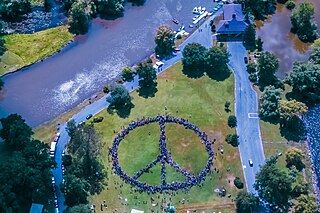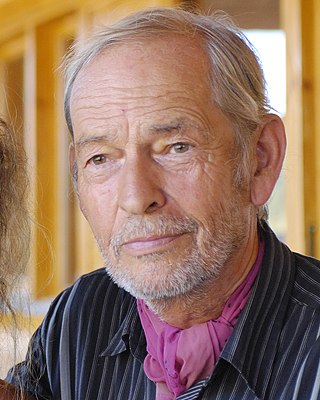The International Fellowship of Reconciliation (IFOR) is a non-governmental organization founded in 1914 in response to the horrors of war in Europe. Today IFOR counts 71 branches, groups and affiliates in 48 countries on all continents. IFOR members promote nonviolence, human rights and reconciliation through public education efforts, training programs and campaigns. The IFOR International Secretariat in Utrecht, Netherlands facilitates communication among IFOR members, links branches to capacity building resources, provides training in gender-sensitive nonviolence through the Women Peacemakers Program, and helps coordinate international campaigns, delegations and urgent actions. IFOR has ECOSOC status at the United Nations.

Nonviolent Peaceforce (NP) is an international nongovernmental organization that employs Unarmed Civilian Protection. Their mission is to protect civilians in violent conflicts through unarmed strategies, build peace side-by-side with local communities, and advocate for the wider adoption of these approaches to safeguard human lives and dignity. NP holds Special Consultative Status with the Economic and Social Council of the United Nations, and has been endorsed by nine Nobel Peace Prize laureates, including the Dalai Lama and former South African Archbishop Desmond Tutu. In 2016, Nonviolent Peaceforce was nominated for a Nobel Peace Prize.
Pietro Ameglio is an Uruguayan-born Mexican civil rights and peace activist known for his advocacy of nonviolence and efforts to promote peace and anti-militarism in Mexico.

Federico Mayor Zaragoza is a Spanish scientist, scholar, politician, diplomat, and poet. He served as the Director-General of the United Nations Educational, Scientific, and Cultural Organization (UNESCO) from 1987 to 1999. After his tenure as Director-General, he continued to participate in various peace-related organizations, such as the Foundation for a Culture of Peace and the International Decade for the Promotion of a Culture of Peace and Non-Violence for the Children of the World, as a member of their honorary boards. Additionally, he serves as the honorary chairman of the Académie de la Paix.
Peace education is the process of acquiring values, knowledge, attitudes, skills, and behaviors to live in harmony with oneself, others, and the natural environment.

The United Nations Alliance of Civilizations (UNAOC) is an initiative that attempts to "galvanize international action against extremism" through the forging of international, intercultural and interreligious dialogue and cooperation. The Alliance places a particular emphasis on defusing tensions between the Western and Islamic worlds.
Quaker Peace & Social Witness (QPSW), previously known as the Friends Service Council, and then as Quaker Peace and Service, is one of the central committees of Britain Yearly Meeting of the Religious Society of Friends – the national organisation of Quakers in Britain. It works to promote British Quakers' testimonies of equality, justice, peace, simplicity and truth. It works alongside both small local and large international pressure groups.

Nonviolence International (NI) acts as a network of resource centers that promote the use of nonviolence and nonviolent resistance. They have maintained relationships with activists in a number of countries, with their most recent projects taking place in Palestine, Sudan and Ukraine. They partnered with International Center on Nonviolent Conflict to update Gene Sharp's seminal work on 198 methods of nonviolent action through a book publication. NI has also produced a comprehensive database of nonviolence tactics, which stands as the largest collection of nonviolent tactics in the world. They partner with Rutgers University to provide the largest collection of nonviolence training materials in the world.

Peacebuilding is an activity that aims to resolve injustice in nonviolent ways and to transform the cultural and structural conditions that generate deadly or destructive conflict. It revolves around developing constructive personal, group, and political relationships across ethnic, religious, class, national, and racial boundaries. The process includes violence prevention; conflict management, resolution, or transformation; and post-conflict reconciliation or trauma healing before, during, and after any given case of violence.

The Peres Center for Peace and Innovation, located in Jaffa, Israel, is an independent non-profit, non-governmental, and non-political organization founded in 1996 by Nobel Peace Laureate and former President of Israel Shimon Peres. Its aim is to further Peres' vision of people in the Middle East working together to build peace through socio-economic cooperation and development and people-to-people interaction.

Rajagopal P. V. is an Indian Gandhian activist, a former Vice Chairman of the New Delhi Gandhi Peace Foundation, and the president and founding member of Ekta Parishad. In 1972, Rajagopal started working alongside Gandhian activists J.P. Narayan and Subba Rao to disarm 578 bandits in the Chambal region of India. Thereafter, he stayed away from dealing with direct violence and focused on the people of Adivasis, bonded labourers, and other landless communities affected by poverty and exploitation.

Dieter Duhm, sociologist, psychoanalyst, art historian and author, is one of the co-founders of Tamera, a peace research center in southwestern Portugal.

Tamera is a peace research village with the goal of becoming "a self-sufficient, sustainable and duplicable communitarian model for nonviolent cooperation and cohabitation between humans, animals, nature, and Creation for a future of peace for all." It is also often called a "healing biotope". Literally translated, "biotope" simply means a place where life lives. In Tamera, however, "healing biotope" is also described as a "greenhouse of trust, an acupuncture point of peace, and a self-sufficient future community." It is located on 335 acres (1.36 km2) in the Alentejo region of southwestern Portugal.

Community Peacemaker Teams or CPT is an international organization set up to support teams of peace workers in conflict areas around the world. The organization uses these teams to achieve its aims of lower levels of violence, nonviolent direct action, human rights documentation and nonviolence training in direct action. CPT sums up their work as being "committed to reducing violence by 'getting in the way'".
Glenn Durland Paige was an American political scientist. He was Professor Emeritus of political science at the University of Hawaiʻi and Chair of the Governing Council of the Center for Global Nonkilling. Paige is known for developing the concept of nonkilling, his studies on political leadership, and the study of international politics from the decision-making perspective with a case study of President Harry S. Truman's decision to involve the United States in the Korean War.

Nonkilling, popularised as a concept in the 2002 book Nonkilling Global Political Science, by Glenn D. Paige, refers to the absence of killing, threats to kill, and conditions conducive to killing in human society. Even though the use of the term in academia refers mostly to the killing of human beings, it is sometimes extended to include the killing of animals and other forms of life. This is also the case for the traditional use of the term "nonkilling" as part of Buddhist ethics, as expressed in the first precept of the Pancasila, and in similar terms throughout world spiritual traditions. Significantly, "nonkilling" was used in the "Charter for a World without Violence" approved by the 8th World Summit of Nobel Peace Laureates.
Michael N. Nagler is an American academic, nonviolence educator, mentor, meditator, and peace activist.
A sustainability organization is (1) an organized group of people that aims to advance sustainability and/or (2) those actions of organizing something sustainably. Unlike many business organizations, sustainability organizations are not limited to implementing sustainability strategies which provide them with economic and cultural benefits attained through environmental responsibility. For sustainability organizations, sustainability can also be an end in itself without further justifications.
George Russell Lakey is an activist, sociologist, and writer who added academic underpinning to the concept of nonviolent revolution. He also refined the practice of experiential training for activists which he calls "Direct Education". A Quaker, he has co-founded and led numerous organizations and campaigns for justice and peace.











